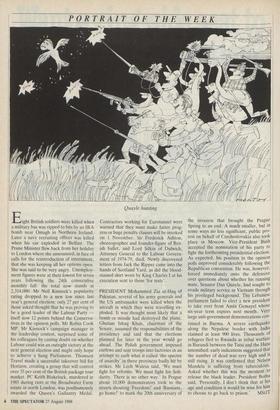PORTRAIT OF THE WEEK
Quayle hunting Eight British soldiers were killed when a military bus was ripped to bits by an IRA bomb near Omagh in Northern Ireland. Later a navy recruiting officer was killed when his car exploded in Belfast. The Prime Minister flew back from her holiday to London where she announced, in face of calls for the reintroduction of internment, that she was keeping all her options open. She was said to be very angry. Unemploy- ment figures were at their lowest for seven years following the 24th consecutive monthly fall: the total now stands at 2,314,000. Mr Neil Kinnock's popularity rating dropped to a new low since last year's general election: only 27 per cent of those asked thought that he was proving to be a good leader of the Labour Party — itself now 12 points behind the Conserva- tives in the opinion polls. Mr Robin Cook MP, Mr Kinnock's campaign manager in the leadership contest, surprised some of his colleagues by casting doubt on whether Labour could win an outright victory at the next general election and might only hope to achieve a hung Parliament. Thomson Travel made a successful takeover bid for Horizon, creating a group that will control over 35 per cent of the British package tour market. PC Keith Blakelock, murdered in 1985 during riots at the Broadwater Farm estate in north London, was posthumously awarded the Queen's Gallantry Medal.
Contractors working for Eurotunnel were warned that they must make faster prog- ress or huge penalty clauses will be invoked on 1 November. Sir Frederick Ashton, choreographer and founder-figure of Brit- ish ballet, and Lord Silkin of Dulwich, Attorney General to the Labour Govern- ment of 1974-79, died. Newly discovered letters from Jack the Ripper came into the hands of Scotland Yard; as did the blood- stained shirt worn by King Charles I at his execution sent to them 'for tests'.
PRESIDENT Mohammed Zia ul-Haq of Pakistan, several of his army generals and the US ambassador were killed when the aircraft in which they were travelling ex- ploded. It was thought most likely that a bomb or missile had destroyed the plane. Ghulam Ishaq Khan, chairman of the Senate, assumed the responsibilities of the presidency and said that the elections planned for later in the year would go ahead. The Polish government imposed curfews and sent troops into factories in an attempt to curb what it called 'the spectre of anarchy' in three provinces badly hit by strikes. Mr Lech Walesa said, 'We must fight for reforms. We must fight for Soli- darity. There is no other way.' In Prague about 10,000 demonstrators took to the streets shouting 'Freedom!' and 'Russians, go home!' to mark the 20th anniversary of the invasion that brought the Prague Spring to an end. A much smaller, but in some ways no less significant, public pro- test on behalf of Czechoslovakia also took place in Moscow. Vice-President Bush accepted the nomination of his party to fight the forthcoming presidential election. As expected, his position in the opinion polls improved considerably following the Republican convention. He was, however, forced immediately onto the defensive over questions about whether his running mate, Senator Dan Quayle, had sought to evade military service in Vietnam through his privileged background. The Lebanese parliament failed to elect a new president to take over from Amin Gemayel whose six-year term expires next month. Very large anti-government demonstrations con- tinued in Burma. A severe earthquake along the Nepalese border with India claimed at least 900 lives. Thousands of refugees fled to Rwanda as tribal warfare in Burundi between the Tutsi and the Hut" intensified: early indications suggested that the number of dead was very high and is still rising. It was confirmed that Nelson Mandela is suffering from tuberculosis. Asked whether this was the moment to release the black leader, President Botha said, 'Personally, I don't think that at his age and condition it would be wise for him to choose to go back to prison.' MStJT














































 Previous page
Previous page